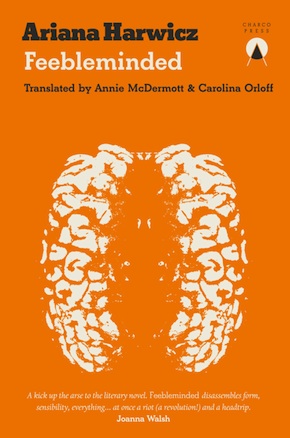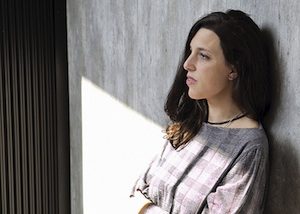Restless days and nights
by Ariana Harwicz
“A book of exceptional power.” Página/12
Here we are in the big, barren guest room. Swarms of flies and bluebottles echo inside it, birds with long beaks like horns, the noise of their songs overlapping. Mum delicately stretching her ash-blonde hair on the bed. Her nightdress is a robe. Are we still going sailing? The build-up of rough stones in a centuries-old house like this one, the damp from the cisterns, deafens us. Let’s go to the pub. It’s closed, it only opens at night. How many times do I have to tell you, alcoholics never see the light of day. Mum changes position, puts her legs back up against the wall. She seeks solace from the impossible meaning. And we laugh, we’re always getting the giggles. Two sleepy loons. Let’s go sailing. And we push each other out of the door, laden with equipment as if we’re off to Niagara Falls. We follow the coast to the river, past cabins and steep slopes. And though we carry a stick to scare them, the hunting dogs bark at us all the way. Ever since a dog bit mum on the arse when she was out on her bike she clings to me as we walk. We untie a plastic raft, climb aboard and set off down the river. Rowing through the foam, battling the turbulence. We sail under Romanesque bridges and along the banks of medieval towns, we pass churches in the thick hot rain. For hours we do nothing but let ourselves be engulfed. The river has burst its banks and mum’s afraid, the air growing murkier and murkier. Suddenly there are waves, hollows, whirlpools, we don’t know how to move in the river, how to read it, we’re rowing in opposite directions. The wind pulls us to one bank and the raft gets stuck in the tender earth. Mum has fainted. I could leave her to drown and go home, call 911 from the petrol station payphone come midnight and explain how I lost her when the water level rose. Then they’ll wrap me in a grey blanket to take my statement, my fingerprints, and I’ll cry on some criminal’s shoulder. Or I could help her climb out. We shelter on a round island, huddle on a patch of wet earth until the urge comes to undress and we run pell-mell through the woods, chased by the sound of buzzing. We cross the plains like two islands in a green sea and at one point I see her crouch down in the undergrowth, tribal.
Desperate to smoke like two chimneys at sunset, to go drinking in a pub full of tattooed sailors and giggle at the bar like two hysterical small-town girls as we feel their biceps.”
Mum asleep with hypothermia under the blankets and hot water bottles. If her temperature goes up, 911. If she has an epileptic fit, helicopter. If she dies tonight, burial. I’m sitting on the blue chair facing the fence. On the table, a plate with some cheese and quince jelly. Mourning begins while she’s still alive. The local cats and parrots have fallen silent. Gradually the childhood stenches return like potions, a hunting trail with huge trees, fragrant wood, conical or vertical canopies. Antique shops, greenhouses, mills on building sites, holiday homes, a tunnel dug with rusty spades in a grove of cedars. Everything always covered in mould. Everything always: fungus, corrosion, rust. Mum sitting me on her shoulders so I can eat straight from the tree, mummy making me walk along a fallen trunk, showing me her sex, waiting impatiently until I’m addicted. Eager for me to gain height, measuring me with a pencil against the wall. Mum delighted when my back’s finally strapped by my very first bra and already I’m talking dirty. Mum beaming the day a man followed me through the woods saying, don’t be afraid. The day a man followed me up the spiral staircase promising a photo of her as a baby. Mum gloating when I started drawing erect penises on the desks at school. Desperate to smoke like two chimneys at sunset, to go drinking in a pub full of tattooed sailors and giggle at the bar like two hysterical small-town girls as we feel their biceps. To go to the urinals and fantasise shamelessly. To dance a bolero pressed up tight against me without worrying the authorities will come after her again, that she’ll have to pick me up later, hanging her head. Trying hard to sound measured like the other women at the police station. These summer days are so long, aren’t they? Winter will be here soon. The light lopped off with an axe at four in the afternoon. Deaths by asphyxiation. I want to throw my childhood away like those balls owls spit out, bits of tooth and brain that their tiny bodies can’t digest.
from Feebleminded, translated by Annie McDermott and Carolina Orloff (Charco Press, £9.99)
 Ariana Harwicz is one of the most radical figures in contemporary Argentinian literature. Born in Buenos Aires in 1977, she studied screenwriting and drama in Argentina, and earned a first degree in Performing Arts from the University of Paris VII as well as a Master’s in comparative literature from the Sorbonne. She has taught screenwriting and written two plays, which have been staged in Buenos Aires. Her first novel Die, My Love was named best novel of 2012 by the Argentinian daily La Nación, and the English translation by Sarah Moses and Carolina Orloff was longlisted for the Man Booker International Prize 2018. It is currently being adapted for theatre in Buenos Aires and in Israel. Feebleminded, the second part in what she calls her ‘involuntary trilogy’, is published by Charco Press in paperback.
Ariana Harwicz is one of the most radical figures in contemporary Argentinian literature. Born in Buenos Aires in 1977, she studied screenwriting and drama in Argentina, and earned a first degree in Performing Arts from the University of Paris VII as well as a Master’s in comparative literature from the Sorbonne. She has taught screenwriting and written two plays, which have been staged in Buenos Aires. Her first novel Die, My Love was named best novel of 2012 by the Argentinian daily La Nación, and the English translation by Sarah Moses and Carolina Orloff was longlisted for the Man Booker International Prize 2018. It is currently being adapted for theatre in Buenos Aires and in Israel. Feebleminded, the second part in what she calls her ‘involuntary trilogy’, is published by Charco Press in paperback.
Read more
@ArianaHar
Annie McDermott’s recent translations include Empty Words and The Luminous Novel by Mario Levrero (forthcoming from And Other Stories and Coffee House Press) and, with Jethro Soutar, City of Ulysses by Teolinda Gersão (Dalkey Archive Press).
@annielmcd
Carolina Orloff is originally from Buenos Aries and is now based in Edinburgh, where she co-founded Charco Press in 2016 and works as publishing director and main editor.
charcopress.com
@caroorloff
@CharcoPress

